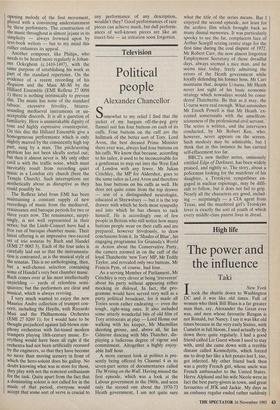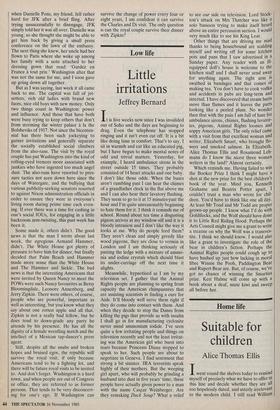High life
The power and the influence
Taki
took the shuttle down to Washington DC and it was like old times. Full of women who think Bill Blass is a far greater man than, say, Alexander the Great ever was, and men whose favourite Reagan is not Ronald, but Nancy. I say it was like old times because in the very early Sixties, with Camelot in full bloom, I used actually to fly down there quite regularly. I had a good friend called Liz Guest whom I used to stay with, until she came down with a terrible disease called Kennedyitis, which forced me to drop her like a hot potato lest I, too, got infected. My other friend back then was a pretty French girl, whose uncle was French ambassador to the United States. Herve Alphand and his wife Nicole were in fact the best party-givers in town, and great favourites of JFK and Jackie. My days as an embassy regular ended rather suddenly when Danielle Pons, my friend, fell rather hard for JFK after a brief fling. After trying unsuccessfully to disengage, JFK simply told her it was all over. Danielle was young, so she thought she might be able to get him back by giving a small press conference on the lawn of the embassy. The next thing she knew, her uncle had her flown to Paris where she woke up among her family with a note attached to her dressing gown that read: `Gardez en France a tout prix.' Washington after that was not the same for me, and I soon gave up going down all together.
But as I was saying, last week it all came back to me. The capital was full of jet- setters, rich old ladies with brand new faces, nice old boys with new money. Only two things count in Washington: power and influence. And those that have both were busy trying to keep others that don't from storming the winter palace a is the Bolsheviks of 1917. Not since the bicenten- nial has there been such jockeying to garner invitations and generally separate the socially established social climbers from the also-rans. The visit by the royal couple has put Washington into the kind of rolling-eyed tremors more associated with junkies who have ingested too much angel dust. The also-rans have resorted to pres- sure tactics not seen down here since the days of Watergate, and the bullying that various publicity-seeking senators resorted to against Nixon administration officials in order to ensure they were in everyone's living room during prime time each even- ing. If ever there was a time for cashing in one's social IOUs, for engaging in a little backroom arm-twisting, this past week has been it.
Some made it, others didn't. The good news is that the man I wrote about last week, the egregious Armand Hammer, didn't. The White House got plenty of pressure to have him for dinner, but finally decided that Palm Beach and Hammer made more sense than the White House and The Hammer and Sickle. The bad news is that the interesting Americans that were invited by Queen Nancy to meet the POWs were such Nancy favourites as Betsy Bloomingdale, Leonore Annenberg, and Jerry Zipkin. There were others, of course, people who are powerful, important as well as interesting, but you know what they say about one rotten apple and all that. Zipkin is not a really bad fellow, but he does tend to down-grade any party he attends by his presence. He has all the dignity of a female wrestling match and the intellect of a Mexican tap-dancer's press agent.
Still, despite all the snubs and broken hopes and bruised egos, the republic will survive the royal visit, if only because Americans tend to be a fighting lot, and there will be future royal visits to be invited to. And don't forget. Washington is a hard town, and when people are out of Congress or office, they are referred to as former persons. That tends to be very disconcert- ing for one's ego. If Washington can survive the change of power every four or eight years, I am confident it can survive the Charles and Di visit. The only question is can the royal couple survive their dinner with Zipkin?



































































 Previous page
Previous page